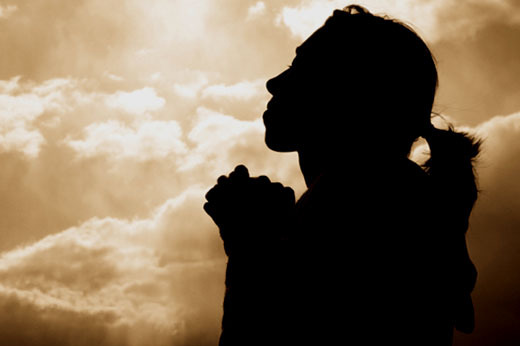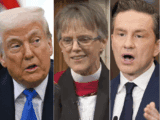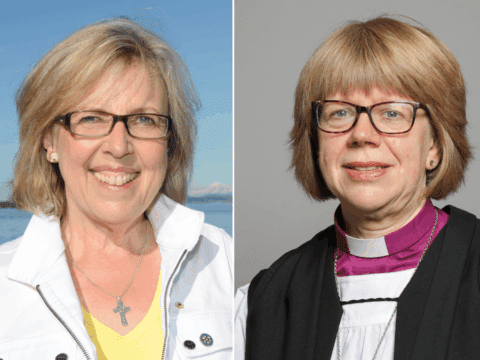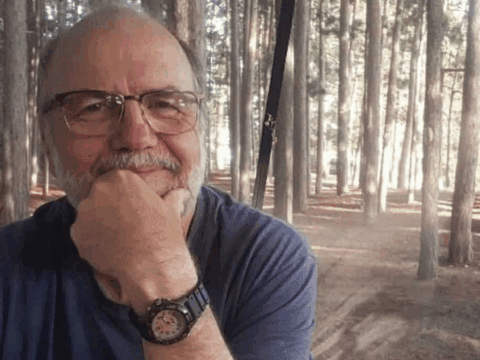The auditorium in the Ottawa public library is full. Stragglers resort to sitting in the aisles and leaning against the walls. Nearly everyone who has gathered appears to be between age 20 and 40. The majority are women. Among the crowd is Evolving Consciousness, a local spirituality group that is enjoying the kind of growth spurt that would turn many churches green with envy. In just four months, 109 “evolving souls” have joined the group. Tonight, 31 members have gathered with about 200 other interested community members to hear Algonquin shaman Pete Bernard talk about forgiveness and participate in a forgiveness ceremony.
Bernard begins. “In the early 1980s, my cousin was killed by a drunk driver. The driver was my next-door neighbour. It took me a long time to forgive him.” For an hour, Bernard extols the virtues of forgiveness. “We have long legacies of not wanting to forgive. . . . When you don’t forgive, there’s a cord that goes between you and the person you won’t forgive. You are feeding something that doesn’t serve you. . . . If you want to be divine, you have to act divine first.” Referring to shamanism, Bernard says, “It’s not about religion. It’s not about right and wrong. It’s a way of life.”
You may unsubscribe from any of our newsletters at any time.
Bernard isn’t alone in his assessment of religion. “Spiritual, but not religious” has penetrated the North American lexicon. Deepak Chopra and Eckhart Tolle are household names. “Be Spiritual” is stamped on tourist destinations, T-shirts and pricey decorative rocks. The word is applied to channelling, meditation, astrology, prayer, 12-step programs, belief in extraterrestrials and how it feels to bite into a slice of cheesecake. Defining the nature of “spirituality” and “religion” and assessing the depth and effect of the “spiritual but not religious” trend isn’t as easy as logging onto one of Oprah’s spirituality tutorials.
Canada’s religious scene isn’t easy to pin down either. When the 2001 Canadian census reported that more Canadians than ever before checked the “no religion” box and that Canadians as a whole aren’t attending religious services as frequently as they once did, headlines predicted the death of religion. Pundits noted that between 1971 and 2001, the number of Canadians identified as having no religion quadrupled, rising from four to 16 percent.
Yet, Canadian sociologist Reginald Bibby concentrates on the sunnier side of the statistics. In his books and research papers, Bibby claims that religion is enjoying a renaissance in Canada. “For all the attention given to the numbers being up for ‘religious nones,’ major [non-Christian] world religions and a variety of fringe groups. . . . Catholic and Protestant groups continue to enjoy a significant monopoly as ‘the market choice’ of almost eight in ten Canadians,” he writes in a 2003 essay.
According to Bibby’s analysis, two-thirds of those who report having no religion will return to the fold later in life.
“The dynamic nature of life means that life’s big ultimate questions are going to be asked and critical life passages are going to be experienced. For many people, such issues and events appear to signal greater involvement, intensified belief and increased commitment with the passage into adulthood and parenthood. That’s why having ‘no religion’ often is not particularly functional and often transitory,” writes Bibby in a 2007 paper.
Warren Clark and Grant Schellenberg, senior analysts with Statistics Canada, add up the numbers favourably, saying that even those who check off the no-religion square are, in fact, religious. “Of those who had not attended any religious services over the previous year, 27 percent engaged in weekly religious practices on their own. Overall, this group of adults who regularly engage in private religious practices, but infrequently or never attend religious services, represent 21 percent of the adult population,” Clark and Schellenberg conclude in a 2006 Statistics Canada report.
On Evolving Consciousness’s web-based message board, a handful of members post their views of religion and spirituality: “Spirituality is the study of spirit or consciousness. Religion is pretty much a prepackaged belief system that seems satisfactory for a lot of people.” “Religion is about listening to other people and taking in their beliefs and ideas. Spirituality is about watching all this as it happens and seeing it for what it is. It’s also about looking within and seeing what reality is really about.” “Religion is blind faith to a pre-made God. It is ritualistic practice fed to the masses. On the other hand, spirituality is the very definition of what it is to be human. We are all spiritual beings having a human experience.”
Pamela Dickey Young, a professor of religion and culture at Queen’s University in Kingston, Ont., says that when “spiritual, but not religious” language turns up in everyday conversation, “it means something about organized religion. It means something about forming my own way rather than having someone tell me what the way is. It means picking and choosing among options and putting that together.”
Between 2002 and 2005, sociologists Heinz Streib and Ralph Hood conducted a study in the United States and Germany in which 1,197 research participants — members and former members of religious organizations — were asked to mark the statement they most identified with: I am more religious than spiritual; I am more spiritual than religious; I am equally religious and spiritual; I am neither religious nor spiritual. In the final analysis, 20 percent of German subjects and 40 percent of American participants said they were more spiritual than religious.
Delving further into what the word “spirituality” meant to those who employed it, Streib found that those who considered themselves more spiritual than religious were also more open to mystical experiences and more accepting of different religious views; they expressed more desire for personal growth and tended to disagree with authoritarian statements of absolute religious truth. In a research paper, Streib expounds on the findings of the study and concludes that “spirituality is a term by which a growing number of people express their quest for deep and authentic ‘religious’ experiences in an open variety of forms, even when these people have no affiliation (any more) with a religious organization.”
Paul Heelas and Linda Woodhead, authors of The Spiritual Revolution: Why Religion Is Giving Way to the Spiritual (Wiley-Blackwell), think religiosity is becoming person-centred in the same way that health care has become patient-centred and education has become learner-centred. They say that the spirituality movement is a “turn away” from life lived in terms of external and objective roles, duties and obligations, and a “turn towards” life lived by reference to the individual’s own subjective experiences (states of consciousness, mind, memories, dreams, feelings and conscience). In their analysis, spirituality is connected to the interior and experiential, whereas religion is connected to the external and institutional. Or, as Sharon Janis put it in Spirituality for Dummies (Wiley), “Spirituality is the banana and religion, the skin.” (The accompanying tip reads, “Respect the banana skin, but eat the banana!”) But when did religion come to be associated with the inedible part?
Sociologists Wade Clark Roof and Robert Wuthnow think that spirituality, the prodigy of religion, started peeling away from its parent during the 1960s. They trace spirituality’s split from religion to the rise of individualism, de-institutionalization, migration and globalization. In an interview with Religion and Ethics NewsWeekly, Wuthnow says that “In the 1950s, there weren’t many places to shop for spirituality unless you went to an organized church or synagogue. Nowadays, you can go to the local bookstore, or a retreat centre or some kind of New Age centre or you can order up tapes or CDs or go to a concert.”
Courtney Bender, associate professor of religion at Columbia University in New York, writes in a 2007 research paper, “What appears from some vantages to be a growing interest in spiritual practice appears from others to be a more complex combination of Americans’ weakening institutional identifications, and our continuing interests in exploring heterodox spiritual ideas.”
On this side of the border, Roger O’Toole, professor of sociology at the University of Toronto, says that religion in Canada has acquired a fragmentary, consumerist character. “In Canada, as elsewhere, increasing autonomization of the individual has led to radical disjunction of the customary link between believing and belonging. Canadians now choose to define the nature and content of their religiosity by drawing from that reservoir of rites, practices and beliefs from which they are most familiar without responding to any institutional prerequisites or with the consequences.” Or as a Macleans magazine headline summed up Canada’s religious scene: “Praise the Lord and call the psychic.”
Did the 1960s watershed send North Americans and Europeans running for the phone? Is spirituality really just post-boomer religion that’s had a facelift to erase institutional lines? Whether or not it is a ’60s spin-off, many scholars are now saying that what is popularly considered “spirituality” really is religion. “If you’re using a definition of religion that has something to do with symbols and meaning-making, then spirituality looks a lot like religion to me,” says Dickey Young.
In a research paper presented last year in Chicago at the annual meeting of the American Academy of Religion, Heinz Streib and Ralph Hood asserted that spirituality should be considered religion and that adjectives such as “tradition-guided,” “charisma-oriented” and “unorganized-experience-oriented” should be used to categorize religious perspectives. They categorized spirituality in the “unorganized-experience-oriented” column.
The proliferation of social networking websites might be contributing to the formation of a fourth category: organized-experience-oriented religion. Technology that helps seekers meet one another also enables them to both believe and belong. Evolving Consciousness, for example, is as organized and as active as many religious groups. Community is formed and developed both on- and off-line. Their calendar is as full as any church’s, albeit the subject matter is a little different: spring equinox talk and ceremony; spiritual cinema; introduction to the Earthwyse Journey; cosmic pathways healing fair. But unlike churches and most other traditional religious institutions for whom organization facilitates outreach to the marginalized, Evolving Consciousness’s mandate is more about reaching in.
Still, Bruna Panetta, the group’s creator and convenor, says that this doesn’t mean group members aren’t interested in social justice. She objects to the stereotypes that portray spirituality groups as narcissistic and navel-gazing. “You become a conscious person not just for yourself, but for others. In the inner-reaching, you can’t help but want to reach out. People come together to expand their own consciousness, but in that expansion they affect the world around them,” says Panetta, who works in the marketing and communications department for a non-profit agency. While Panetta isn’t sure whether the group as a whole will ever become involved in social outreach, she thinks that people who have evolved spiritually as a result of the group’s exploration will reach out to others in their own lives.
As organized as Evolving Consciousness is, Panetta insists, “We aren’t a religion. We don’t believe in one deity. We don’t have a dogma or a creed. We’re basically just people who want to get in touch with our spiritual selves.” A former Catholic, Panetta’s own exodus from the church began when she discovered the gnostic gospels. “I figured that if the church wasn’t going to tell me the whole story, I’d have to find out on my own.”
Rightly or wrongly, spirituality groups are often criticized for being anti-social and uninterested in social justice. But the self-help focus isn’t the only critique. Many point out the contradiction implicit in borrowing heavily from religious traditions to inform spiritual ideas and practices while at the same time accusing them of being outmoded. Some are concerned that when people shop in a global spiritual marketplace without the qualified guides or guideposts that come with having religious traditions, they are more apt to purchase empty packages and get lost along the way.
Kieran Flanagan, professor of sociology at the University of Bristol in England, says that in today’s spiritual commerce, clients need enablers “who can tap in and turn on spiritual powers. These diviners can sell bogus wares in a spiritual marketplace, entrapping the theologically witless and those seeking the quick-fix spiritual solutions for their restless souls. . . . The privatization of spirituality enables psychology to replace theology as arbiter on practice and wholeness.” Equally skeptical, in Selling Spirituality: The Silent Takeover of Religion (Routledge), Jeremy Carette and Richard King call spirituality the “new cultural Prozac.” They assert that spirituality, taken over by big business, is a currency spent to pacify anxiety. “In the very act of freeing the mind from the dogma of religion, consumers have now entered the thought control of individualism,” write Carette and King.
It’s hard to say how those practising de-institutionalized religion process their thoughts. Contemporary studies have concentrated more on those participating in traditional religious communities than those outside them. How proponents of do-it-yourself religion decide which components to put together, what tools to use in the construction and where those tools come from largely remains unexamined.
Evolving Consciousness is fond of field trips. Since it doesn’t have its own building, meetings are held in a variety of venues. Panetta says the group chooses events to attend and aspects of spirituality to explore based on how they “relate to the idea of expanding consciousness.” She uses Ottawa’s Tone Magazine, a self-described “forum for the consciousness-raising community” as a guide. Some people in the group, she says, “are professionals in the spirituality field and have offered workshops at a reduced rate.”
As eclectic as her choices seem, Panetta isn’t going to sample everything on the spiritual buffet. “Some members are interested in the paranormal, but the group isn’t focused on those types of things. If someone wanted us to go out and wait for UFOs all night, I might suggest that they find another group,” she laughs, adding, “We’re not going to talk about ghosts, either.” When pressed to explain the criteria she uses to choose which seminars to attend or ideas to pursue,
Panetta cites the raison-d’être posted on the website: “Calling all light workers and those with a passion for spirituality and the quest to know more. This meet-up group is open to all those with an interest in conscious expansion and shifting paradigms.”
Paradigms are definitely shifting and not necessarily in a bad way. In Spiritual, But Not Religious: Understanding Unchurched America (Oxford University Press), Robert Fuller, professor of religious studies at Bradley University in Illinois, holds a positive view of those who are spiritual but not religious. He writes that many who practise spirituality today reach “as high a level of spiritual maturity as might reasonably be expected in our modern era.” Fuller says that those who consider themselves spiritual but not religious tend to agree that for religion to be viable, it must draw from science, modern psychology and the best insights of the world religions; it must have practical applications to everyday life; and it must offer experiential spirituality, not lifeless rituals.
No doubt, many Christians would shout “Hallelujah!” or at least mutter a reserved “amen” to those principles.
Perhaps spiritual seekers both in and outside the church are more alike than different. In fact, Wade Clark Roof suggests that contemporary society as a whole, irrespective of whether people consider themselves religious or spiritual, is morphing into a “quest culture.” In Roof’s opinion, societal fragmentation and modern detachment from traditional religious anchors have caused people to hoist their sails in search of meaning. He says that words like “journey, walk and growth” are prominent both inside and outside the church. “Quest,” he notes, is now a brand of vehicle and a type of Bible.
There is no denying that the spirit-seeking quest culture has permeated Christianity. Churches are now “seeker-sensitive” and “seeker-friendly,” and practices have been developed to help them become even more so (see sidebar, facing page). “Spirituality of” books line Christian bookshelves and are applied to both activities and objects, like gardening and wine. Spiritual practices such as meditation and chanting are enjoying a resurgence. Christian mystics Hildegard of Bingen, Julian of Norwich and Teresa of Avila have never been as popular.
Christians are taking spirituality on the road, too. Spiritual pilgrimages, retreats and travel destinations are casting the hope of spiritual fulfilment on the horizon. For those who want to quest without straying too far from home or parting with a lot of cash, labyrinths are being constructed on church yards. Even less adventuresome questers will not be excluded: “mindful walking” promises to transform a run-of-the-mill trip to the loo. The spirit is definitely emerging.
Whether the questing and seeking will prove insignificant or catalyze the kind of “tectonic shift in the sacred landscape more significant than the Protestant reformation” that Heelas and Woodhead predict is as uncertain as a deck of tarot cards. But there’s no doubt that it is propelling many to experience what 18th-century theologian Friederich Schleiermacher described as “the feeling of absolute dependence on God” and the “taste for the infinite.”
Back in the auditorium, the sacred landscape is shifting. “We’re going to journey to the upper world tonight where time and space don’t exist. I’m going to open the portal between you and three people you need to forgive. They will be real. You will have a chance to experience them,” says the shaman. Some begin to remove their coats. Others take off their boots. Rows of heads bobble and bow as people settle into their seats, some resting their heads on the back of their hands folded over the chair in front of them. Silence.
In the presence of the “portal,” the definition of religion that William James penned back when writing implements came with inkwells comes to mind: the feelings, acts and experiences of individuals in their solitude, so far as they apprehend themselves to stand in relation to whatever they may consider divine.
This story first appeared in The Observer’s June 2009 issue with the title “‘I’m not religious. I’m spiritual.'”














